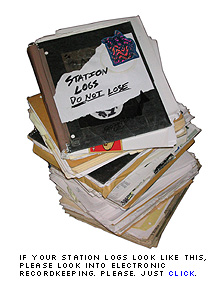RadioActivity.fm: Articles
On the SoundExchange "Reports of Use Delivery Specifications"
Chapter 2: Key concepts and issues
From a purely data-management perspective, the problem looks fairly easy:
1) Document all of your station's playlist data.Sound easy, right?
2) Format this data according to the specifications provided by SoundExchange.
3) Send this data to SoundExchange on a quarterly timeline.They will acknowledge its receipt.(Or not - see the notes at the end of this article)
4) Everybody's happy.
Consider part 1) Record/document all of your station's playlist data - and note the data fields:
Name of service
Transmission category
Featured Artist
Sound Recording Title
ISRC code OR
Album Title & Marketing LabelActual total performances OR
Aggregate tuning hours & Channel/Program name & Play frequency
Bolded fields are mandatory. Italicized fields represent either/or combinations the station must choose between. I.e. a station can report the ISRC *or* the Album Title and Label.
Looking at these eleven fields, the playlist recordkeeping becomes an interesting challenge when you consider the wide variety of broadcasting and streaming setups.

Taking the least-common denominator approach, some services (such as RadioActivity.fm) have created logging solutions for DJ's to manually record their playlists, either online or via software application. Some stations have built "roll your own" solutions to the same effect. Rudimentary recordkeeping can even be achieved (poorly) with Microsoft Excel or Notepad, for that matter. The challenge lies in the various analyses and formatting that must be applied to this data to make it fit the reporting specs.
(The techniques and formatting issues discussed here apply to manual-entry systems and automated systems alike, as both will ultimately have to meet the same formatting spec. It is RadioActivity.fm's belief, however, that while 'total package' automation systems exist, a vast majority of stations will rely on some sort of manual playlist entry.)
Manual entry presents a small set of issues, such as:
Problems related to human input - spelling and capitalization mistakes, typos, etc.
Incomplete entries - due to a number of factors, DJ's will not always have all the mandatory information on hand needed to complete a "full" reporting entry.
Music from nonstandard origin - including promotional, self-produced, non-mainstream submissions that lack the mandatory information needed to complete a "full" reporting entry.
Challenges involving automation/live mixes - humans can record all their plays, but a 'jukebox' style source usually cannot. Even if they can, their native recordkeeping format must be merged into the SoundExchange format during reporting.
Even with the above in mind, the four mandatory fields identified so far are simple to report. Name of Service and Transmission Category won't change, so Featured Artist and Sound Recording Title are the two important fields identified so far for each playlist entry.
The next few fields are more demanding...
Click here to continue to Part 3: Decisions, decisions
|
Part 1: Introduction Part 2: Part 3: Decisions, decisions Part 4: Aggregate Tuning Hours Part 5: The SoundExchange reporting specs Part 6: Conclusions |
